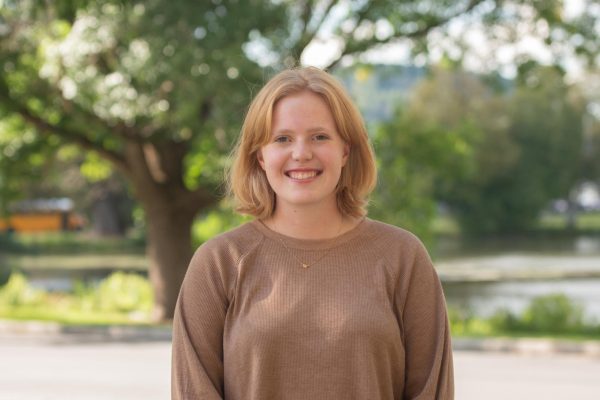Colgate Hosts Clive Hamilton to Discuss the Chinese Communist Party
Australian professor Clive Hamilton joined Colgate students, faculty and alumni to discuss the role of the Chinese Communist Party (CCP) in the global economy in relation to his and co-author Mareike Olhberg’s recently published book, “Hidden Hand: Exposing How the Chinese Communist Party is Reshaping the World.”
Most widely known for his book “Silent Invasion: China’s Influence in Australia,” which was pulled by several publishers out of fear of retribution from Beijing, Hamilton has been serving as the Professor of Public Ethics at Charles Sturt University in Canberra since 2008. He was virtually hosted by Colgate’s Lampert Institute for Civic and Global Affairs on Thursday, March 11.
Colgate Associate Professor of Political Science and Director of the Lampert Institute Illan Nam directed the conversation with Hamilton. She reflected on the reasoning and success of the event.
“One of the Lampert Institute’s aims is to have conversations about important geopolitical developments taking place in other regions of the world that have important global consequences,” Nam said. “[Hamilton and Olhberg’s] work unpacks the Chinese Communist Party’s organizational development that enables the party to expand its influence over elite institutions in both authoritarian and democratic regimes as well as multilateral institutions. The event was well-attended, and students, faculty, and alumni participated in a lively and extended Q&A session.”
Junior Sarah Neubecker, who attended as part of her Political Economy of East/Southeast Asia class, reflected on her takeaways from the webinar — specifically an understanding of the influence of the CCP in the United States.
“I don’t think many people realize how much the CCP has infiltrated organizations like the United Nations, World Health Organization and even ‘independent’ organizations like News Journals and Publishers,” Neubecker said. “As Professor Hamilton said, the Chinese Communist Party is perhaps one of the greatest threats to the liberal international world order today, and not many people take it seriously enough at present.”
Senior Annalise Simons, who also attended the webinar, reflected on the importance Hamilton’s talk posed to the institution of Colgate University itself.
“I think his talk relates to daily life here, as he noted that academic institutions are also affected by Chinese Communist Party’s initiatives to exert influence throughout the world and to enhance support and tolerance for Chinese Communist Party goals,” Simons said. “I think it is an interesting claim to keep in mind as one observes how Colgate discussions operate relating to China in the future.”
Nam echoed Hamilton’s opinions, saying that the global influence of the CCP threatens democracies.
“In their view, the Chinese Communist Party’s efforts to exercise soft power abroad so that it can better shape how its policies, such as domestic repression of its citizens, clamping down on Hong Kong democracy, among others, are perceived and interpreted poses threats to democracies,” Nam said.
Neubecker said she felt the threat of the Chinese Communist Party to democracies was important for college students to consider and confront.
“I think Professor Hamilton’s comments on the subtle infiltration and manipulation in our own world is important for our day-to-day lives, especially regarding censorship and the CCP,” Neubecker said. “I was appalled to find out that supposedly independent publishers and even Hollywood have been “censoring” their content to avoid economic/social retaliation by the CCP. As college students, I think we have an obligation to oppose censorship and maintain the freedom and independence of the press in all its forms.”
Simons said she felt Hamilton’s virtual visit helped to engage Colgate students and faculty with the most pressing public policy issues shaping the trajectory of the 21st century.
“I think this talk was beneficial because Professor Hamilton researches this topic that is distinct from a lot of discussions and coursework at Colgate. I had not previously had many discussions relating to this specific topic at Colgate, and I find his perspective bold and thought-provoking. I think it is important for Colgate students to hear from scholars that study unique and complex topics,” Simons said.
Neubecker said Hamilton’s expertise on the subject as well as his proximity to the country in discussion allowed him to provide perspective to all that attended, especially those on campus.
“Professor Hamilton had a long career of studying the Chinese CCP, especially in his native Australia, which has a much greater proximity to China and the Asian Pacific than Colgate does,” Neubecker said. “Hosting outside speakers like Professor Hamilton greatly elevates our knowledge and concern for global issues outside the Colgate bubble.”

Elli Ament is a senior from Littleton, CO concentrating in history with a focus on cultural history and media. She has previously served as a Commentary...











